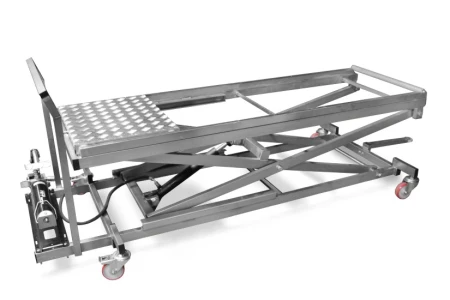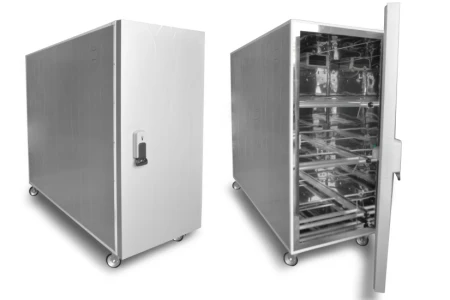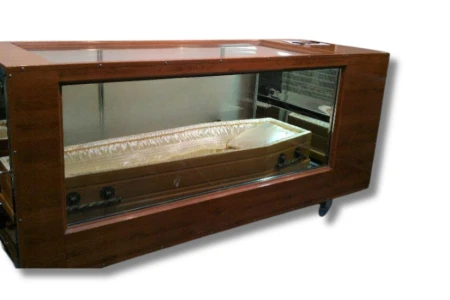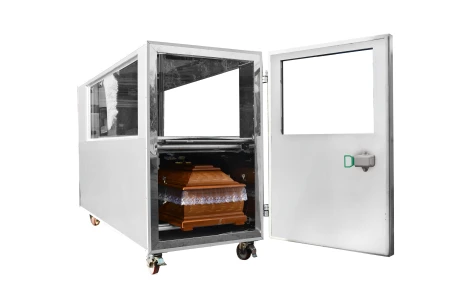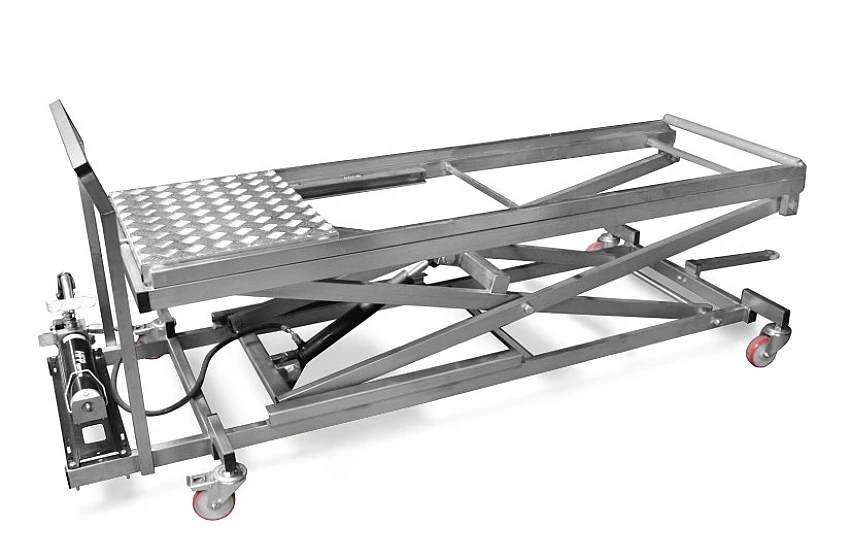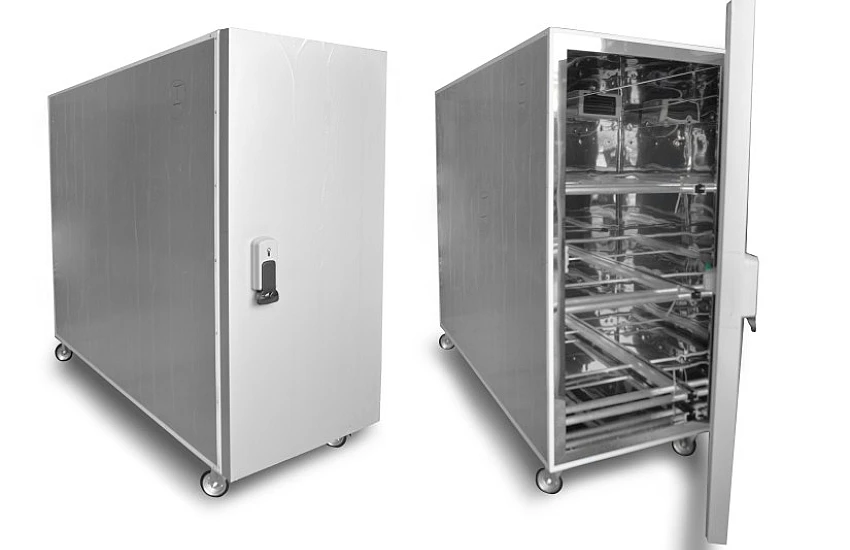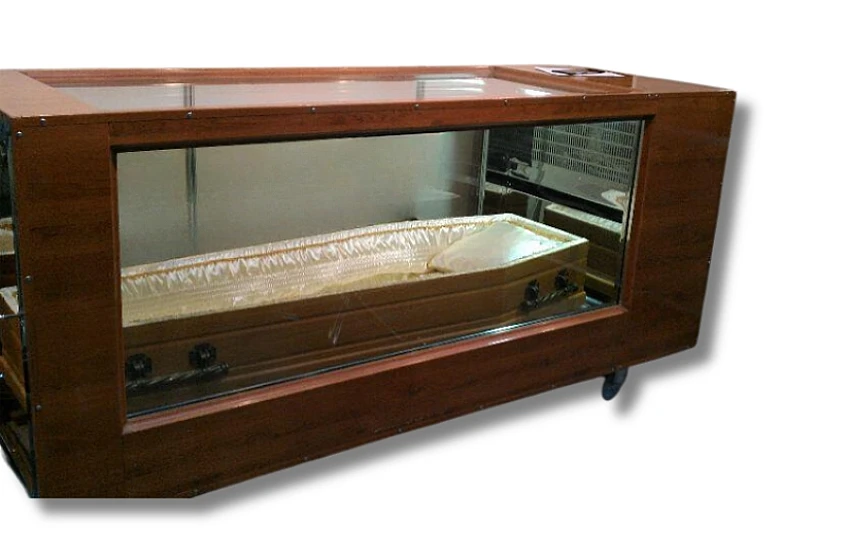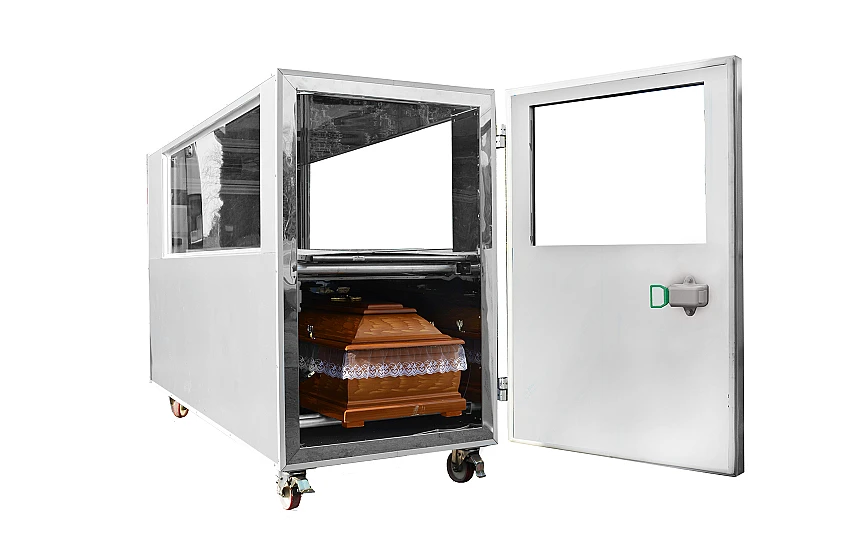Table of Contents
- What Are Refrigerators for Corpses?
- The Role of Refrigerators in Funeral Homes
- Why Are Refrigerators for Corpses Essential in a Funeral Home?
- How Do Refrigerators for Corpses Work?
- Modern Technologies Used in Refrigerators
- Types of Refrigerators for Corpses Available on the Market
- How to Choose the Right Refrigerator for a Funeral Home
- Advantages of Having a Professional Refrigerator in a Funeral Home
- Hydraulic Cart for Refrigerators
- Storage of Corpses in Refrigerators – Regulations and Recommendations
- The Importance of Investing in Refrigerated Storage for Funeral Homes
- FAQ – Frequently Asked Questions About Refrigerated Storage for Corpses
Refrigerated storage for corpses is a key component of the infrastructure in funeral homes, enabling bodies to be stored under controlled temperature conditions. Before a funeral ceremony or cremation, these refrigerators provide hygienic and safe conditions that slow down the decomposition process. Such equipment plays a crucial role in preserving the dignity of the deceased, as well as ensuring the sanitary safety of both the staff and the families visiting the facility.
What Are Refrigerators for Corpses?
Refrigerated storage units for corpses are specialized devices designed to store deceased bodies at appropriate temperatures, thereby slowing down natural decomposition processes. By maintaining low temperatures, these refrigerators ensure hygienic and secure storage of bodies prior to a funeral or cremation. They are an indispensable element of funeral home equipment, particularly in cases where the funeral must be postponed to a later date.
The Role of Refrigerators in Funeral Homes
The role of these refrigerators is vital for maintaining sanitary standards and providing comfort for grieving families. They allow for dignified preparation of bodies while minimizing risks related to hygiene and workplace safety. With the aid of refrigerated storage, funeral homes can offer professional services at the highest level, ensuring that bodies are stored under proper conditions even for extended periods.

Why Are Refrigerators for Corpses Essential in a Funeral Home?
Refrigerators for corpses play a critical role in ensuring that bodies are stored appropriately while awaiting funeral ceremonies.
The Importance of Proper Body Storage
Controlling the temperature effectively slows down natural decomposition—a factor that is particularly important when the funeral date is delayed. Refrigerated storage ensures that the body is maintained under dignified conditions, which is significant both aesthetically and emotionally for the grieving family.
Maintaining Proper Sanitary Conditions
Another key aspect is sanitation. Refrigerators minimize the risk of bacterial spread and unpleasant odors, which is crucial for the safety of both the staff and visitors. Modern refrigeration units allow precise control of humidity and temperature, ensuring optimal storage conditions that reduce hygiene-related risks.
Legal Regulations for Body Storage
Legal regulations clearly mandate that funeral homes must provide appropriate sanitary conditions, including the use of refrigerated storage. Adhering to these standards is essential not only for the legal operation of the facility but also for ensuring the safety of clients and employees. Refrigerators for corpses are thus both a technical requirement and a means of ensuring compliance with regulatory standards, which reflects the professionalism of the services provided.
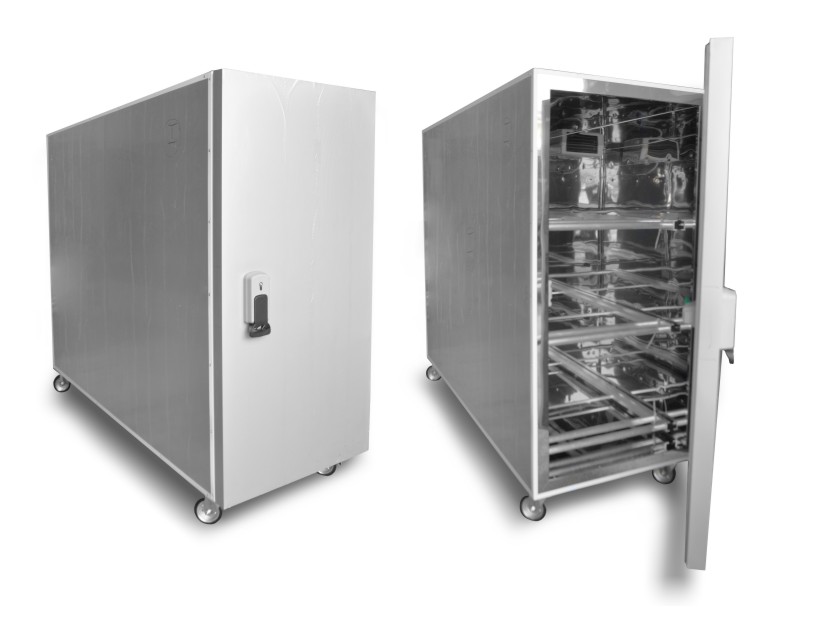
How Do Refrigerators for Corpses Work?
Refrigerated storage units operate based on cooling systems that maintain low temperatures—typically ranging from 0°C to 10°C—to effectively slow down the decomposition of bodies. Many models offer additional settings that can lower the temperature even further, down to -5°C. In funeral homes, these units are critical for providing hygienic storage between the time of death and the funeral. Their operation is based on the circulation of cold air, which ensures even cooling and prevents the development of microorganisms and unpleasant odors.
Modern Technologies Used in Refrigerators
Modern technologies in funeral home refrigerators include digital controls for temperature and humidity, allowing for precise adjustment of storage conditions. Additionally, many contemporary units come with automatic defrosting functions and antibacterial systems, which enhance sanitary safety and ease the workload of the staff. Some models also offer remote monitoring capabilities, simplifying the management of the refrigeration system within funeral homes.
Types of Refrigerators for Corpses Available on the Market
Several types of refrigerated storage units are available on the market, differing in construction and application, so that funeral homes can choose equipment that best suits their needs.
Refrigerators on Wheels
These mobile units allow for the easy transportation of bodies within the facility, which is especially practical in locations with limited space. They are lightweight, compact, and ideal for smaller funeral homes or short-term storage needs.
Click here to find the most popular and proven models of refrigerated storage units for corpses.
Refrigerated Catafalques
Glazed refrigerated catafalques offer a more advanced solution by combining body storage with the ability to display the deceased during funeral ceremonies. The glass enclosure allows for dignified viewing under controlled temperature conditions, which is particularly useful during longer ceremonies. These advanced devices vary in technical parameters such as capacity, temperature range, and construction materials—ranging from metal sheets to wood finishes.
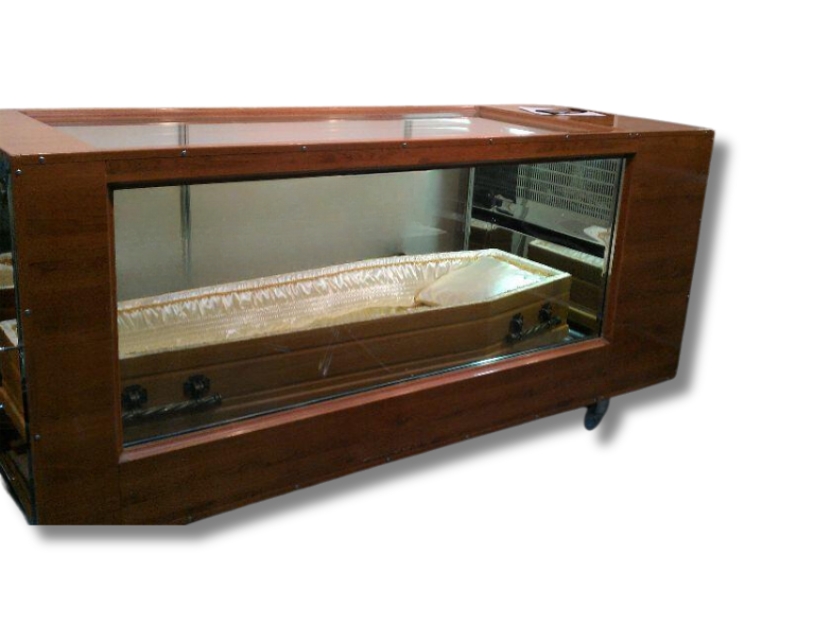
How to Choose the Right Refrigerator for a Funeral Home
Selecting the appropriate refrigerated storage unit for a funeral home requires considering several key factors.
Key Factors in Choosing a Refrigerator
The first factor is the size of the facility and the number of bodies to be stored. Larger funeral homes may require more spacious, stationary refrigerators, while smaller establishments might benefit from mobile solutions like refrigerators on wheels.
Cost of Purchase and Operation
Investment costs are another important consideration. While modern refrigerators can be a significant investment, energy-efficient technologies may result in lower operational costs over the long term.
Technical and Spatial Requirements
When choosing a refrigerator, it is important to consider technical and spatial requirements. Some units may need special installation conditions, such as proper ventilation or a dedicated space. The refrigerator should be tailored to the specific needs of the facility, allowing for efficient space management and workflow optimization.
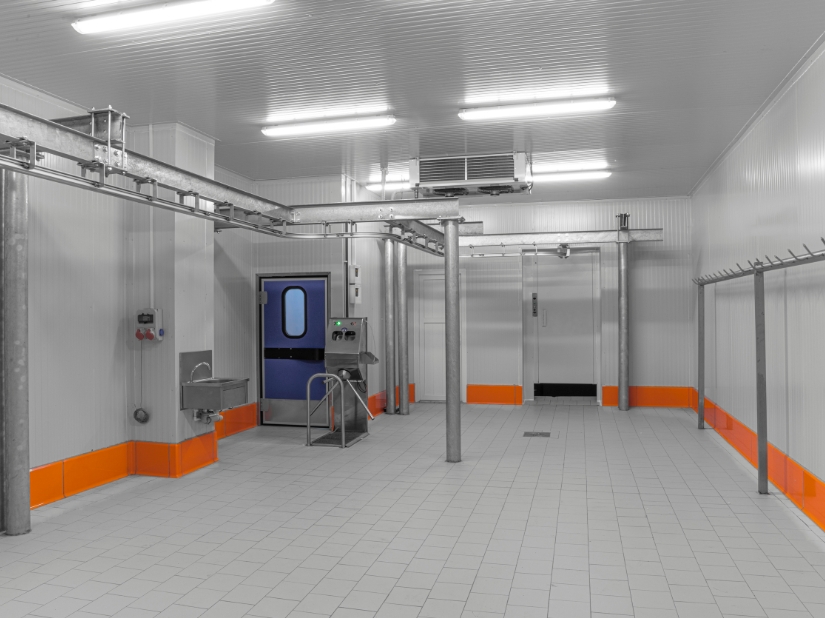
Advantages of Having a Professional Refrigerator in a Funeral Home
Investing in a professional refrigerated storage unit brings numerous benefits to a funeral home. Primarily, it ensures better working conditions and sanitary safety, which is crucial for both the staff and the families visiting the facility. Refrigerators provide optimal hygienic storage, significantly reducing the risk of bacterial spread and unpleasant odors.
Furthermore, these units streamline funeral processes, enabling the facility to better manage scheduling and organization of ceremonies. Flexible scheduling made possible by reliable refrigerated storage enhances the credibility and professionalism of the funeral home. Having modern refrigeration equipment is a clear sign that the establishment values service quality, directly impacting its reputation in the industry.
Hydraulic Cart for Refrigerators
A hydraulic cart for refrigerators is an extremely useful tool in funeral homes, facilitating the transport of bodies to and from the refrigerated storage. With a hydraulic lifting mechanism, these carts allow for the safe and convenient movement of bodies at various heights, reducing physical strain on the staff and minimizing the risk of damage to the body. Hydraulic carts often feature height adjustment and wheel locks, ensuring stability and precision when maneuvering in the confined spaces of a refrigerator.
Such devices are indispensable in the daily operations of funeral homes, especially in large refrigeration units where bodies must be moved frequently. Modern hydraulic carts are built from durable, corrosion-resistant materials, ensuring longevity and safe operation in the challenging conditions of a funeral home. Choosing the right hydraulic cart, tailored to the facility’s requirements, is an essential element in optimizing workflow and improving service standards in the funeral industry.
The Most Popular Model of a Refrigerator Cart
One of the most popular models is the hydraulic cart with a foot pump, available in our store. This model is distinguished by its robust construction, which enables the safe and convenient transport of bodies even in confined refrigerator spaces. The cart features a hydraulic lifting system controlled via a foot pump, allowing for precise height adjustments according to specific needs. With smoothly rolling wheels equipped with locks, it ensures stability during transport and ease of maneuvering. Constructed from corrosion-resistant materials, it guarantees long-lasting performance in the demanding environment of funeral homes.
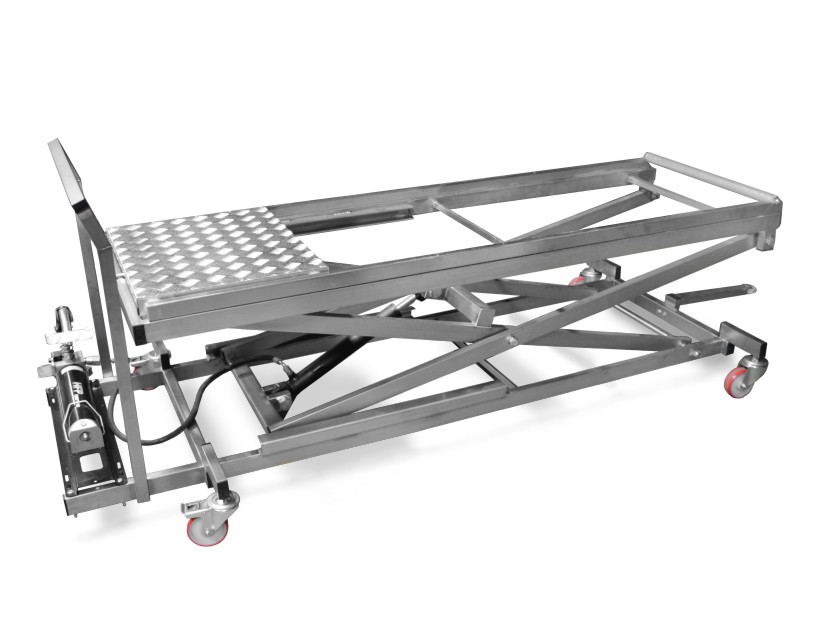
Storage of Corpses in Refrigerators – Regulations and Recommendations
The storage of bodies in refrigerated units is strictly regulated by Polish legal standards. These regulations require funeral homes to maintain appropriate sanitary conditions, including the use of refrigerated storage. Compliance with these standards is not only a legal necessity but also a matter of ensuring the safety of clients and employees.
Additionally, sanitary and hygiene guidelines for refrigerated storage include regular disinfection of the units, temperature control, and proper ventilation of the rooms where bodies are stored. Funeral homes must also ensure adequate working conditions to meet all sanitary norms and avoid potential sanctions.
The Importance of Investing in Refrigerated Storage for Funeral Homes
Investing in refrigerated storage for corpses is an essential aspect of operating a modern funeral home. A properly selected refrigerator not only ensures compliance with legal requirements but also enhances the overall quality of the services provided. Proper body storage allows for flexible and professional handling of funeral arrangements, which builds trust and enhances the reputation of the funeral home within the local community. In the long term, such an investment translates into increased operational efficiency and greater satisfaction for grieving families.
FAQ – Frequently Asked Questions About Refrigerated Storage for Corpses
What are the maintenance costs of a refrigerator?
Maintenance costs depend on the model and technology used. Modern refrigerators are energy-efficient, which can lower operational expenses. Regular technical inspections and disinfection are also important cost factors.
How many bodies can be stored at once?
The capacity of a refrigerator varies by model. Standard refrigerated units can typically accommodate from one to several coffins simultaneously, allowing funeral homes to manage storage flexibly.
What are the alternatives to traditional refrigerators?
Alternatives to traditional refrigerated storage include glazed refrigerated catafalques or mobile refrigerators. These solutions offer greater flexibility, facilitating easier movement of bodies or their presentation during funeral ceremonies while maintaining the appropriate temperature.






